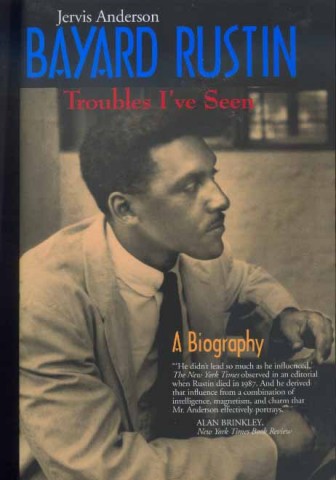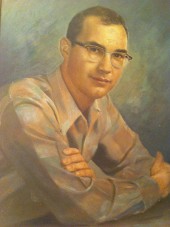June 10, 2008.
At first it seems that if the pioneers of the homosexual civil rights movement would have been able to do a lot more if they had the tools, such as computers and the Internet and cell phone, that we have today.
I don’t think so. You can not judge such things by looking back.
But it is clear that nothing they could have said to more people with the Internet, or had cheaper ways of reaching people, etc. would have affected the world of that day any better than they did.
We forget, not only in the homosexual civil rights movement but in all civil rights movements, that it is not just the words and “news” that the public gets that instantly changes them but education over time. We also forget that the same “media” in the 1950s and ’60s that were extremely anti-gay were also extremely anti-black, etc.

It might be a good sociological learning experience to read a biography of Bayard Rustin, the Don Slater of the black movement, such as Bayard Rustin, The Troubles I’ve Seen. He was one of the greatest organizers of his time, and did the March on Washington. But he had to constantly fight the lies of the FBI and the jealousy of other black leaders who were afraid Dr. King et al. would get more credit for changing things than they did.
If you think Senator Hilary Clinton’s words saying that it took President Johnson to fulfill the dream of Dr. King, you will know find that Wilkins and the NAACP were thinking the same thing. He once told King that he had spoken good words but had not changed a single law, which is the same argument.
And it was the local newspaper that tried to get Rustin killed, and worked with bigoted politicians to try to stop the marches in Alabama. Nothing a computer or the Internet could have done then would have changed that fact.
And when Rustin’s homosexuality was used by jealous black leaders, nothing at the time would have prevented that. Rustin, like Don Slater, and sort of like Barney Frank of today, was a practical person who didn’t waste time talking about some dream but worked to get things done that could be done at the time.
So I don’t think we need an article praising the computer and internet. We need to use it today, but it would have made no difference in the ’50s and ’60s. And, it can be helpful today only because of what we did in the ’50s and ’60s to prepare people to “hear” the truth.
While is is truly frustrating in each decade to hear young people say they did not know there were others like them, and they can now find information and chat rooms on the Internet, these were available from the day a Mattachine subgroup opened shop as ONE in 1953 and had a phone, public office, and a magazine that was available on newsstands in most major cities. Anyone who sought information in the ’50s could have found ONE magazine, and then Mattachine Review, The Ladder, Drum, Vector, and The Advocate.
And we were holding national meetings, appearing on radio and television shows, so that there has to be some other explanation if people in the ’60s on did not know that homosexuals were speaking out. We were winning court decisions in the U.S. Supreme Court in 1958. The media ignored this and only ran terror articles accusing us of being child molesters, or traitors (quoting McCarthy) without doing any checking for facts, which they are still guilty of today. And so it seems to me that it is the fault of these people if they did not learn about homosexuality until they saw Ellen, or saw some cute girl or guy on a TV show.
And when people seek information on the Internet today, which websites do they go to? HRC’s? The Tangent Group’s? Or do they go to some sex chat room and share ignorances?
What has truly changed is that the media can no longer just publish or speak what anti-gay bigots say. MTV shows homosexuals living with heterosexuals in The Real World. And Brothers & Sisters shows a gay wedding and reaches people no gay publication can. Logo does nothing that helps promote homosexuality. And the glossy gay men’s magazines do little for our community/movement — they promote expensive cars, clothing, and vacations. If that is what the computer and Internet have given us, it is no improvement.
Where is serious discussion of issues of homosexuality? The media is flooded with “news” about same sex marriage. Is that the only issue homosexual Americans face? What about how we deal with issues that are not simple?
For instance, we oppose in theory the war in Iraq, but we must face the news every day that Islamists are killing homosexuals. What do you think we should do if you oppose the war? If you have no alternative, you are no better than the present administration.
Again, even Bayard Rustin had to come to a view about dealing with the world that he did not have at first as a pacifist. And he had to deal with the issue of trying to work for more than one cause at the same time. He chose the black cause but never doubted that the homosexual cause needed support, too. He also knew that it would hurt both causes if they were combined. That is an issue we face today.
Are all of these courses/classes in colleges actually giving information on homosexuality any better than MTV? Are all of these Web sites and blogs on the Internet giving us any better ideas?
That is why we need the pioneers back. They were thinkers. I don’t see any thinkers in our community today. And the Internet, so far, can not do the thinking.
Much of their thinking is available today, in our dozen or so libraries/archives. But the gay press ignores these resources. They aren’t “sexy.” The only hope is that once we get all of our history on the Internet, some day serious citizens will seek this information out, and it will be there thanks mainly to the pioneers.


